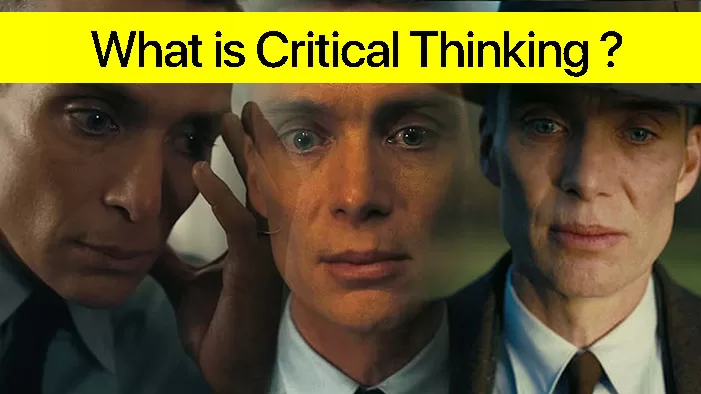Critical thinking is the ability to think clearly and rationally, evaluating information and arguments in order to form a judgment.
It is a skill that can be learned and developed, and it is essential for success in many areas of life, including school, work, and personal relationships.
Critical thinkers are able to:
- Identify and evaluate arguments: Critical thinkers can identify the premises and conclusions of an argument, and they can evaluate the strength of the argument by considering the evidence and the reasoning.
- Recognize bias and fallacies: Critical thinkers can identify when an argument is biased, and they can recognize common fallacies, such as ad hominem attacks and straw man arguments.
- Analyze information and draw conclusions: Critical thinkers can analyze information and draw conclusions based on the evidence. They can also identify the strengths and weaknesses of different pieces of evidence.
- Solve problems effectively: Critical thinkers can solve problems by identifying the root cause of the problem, generating creative solutions, and evaluating the effectiveness of those solutions.
- Communicate their ideas clearly and persuasively: Critical thinkers can communicate their ideas clearly and persuasively, both orally and in writing. They can also tailor their communication to the audience they are addressing.
Critical thinking is not just about being able to spot flaws in other people’s arguments. It is also about being able to think for yourself and form your own opinions based on evidence.
Critical thinkers are not afraid to question the status quo, and they are always open to new ideas.
Table of Contents

The Benefits of Critical Thinking
There are many benefits to developing critical thinking skills. Some of the most important benefits include:
- Improved decision-making: Critical thinkers are better able to make informed decisions because they are able to gather information, weigh the pros and cons of different options, and identify potential risks.
- Increased problem-solving ability: Critical thinkers are better able to solve problems because they are able to identify the root of the problem, generate creative solutions, and evaluate the effectiveness of those solutions.
- Enhanced communication skills: Critical thinkers are better able to communicate their ideas clearly and persuasively, both orally and in writing. This can be helpful in both personal and professional settings.
- Increased self-awareness: Critical thinkers are better able to identify their own biases and limitations, which can help them to make better decisions and to communicate more effectively.
How to Improve Your Critical Thinking Skills
There are many ways to improve your critical thinking skills. Some of the most effective methods include:
- Ask questions: When you are presented with information, ask questions about the evidence, the reasoning, and the conclusions.
- Be open-minded: Be willing to consider different perspectives and to change your mind if the evidence warrants it.
- Be aware of your own biases: We all have biases, but it is important to be aware of them so that we can avoid letting them cloud our judgment.
- Practice: The more you practice critical thinking, the better you will become at it. So start practicing today!
Critical thinking is a valuable skill that can be learned and developed. By following the tips above, you can improve your critical thinking skills and become a more effective thinker.
Conclusion
Critical thinking is a skill that is essential for success in many areas of life. By learning to think critically, you can improve your decision-making, problem-solving, and communication skills.
You can also become more aware of your own biases and limitations, which can help you to make better decisions.
If you are interested in learning more about critical thinking, there are many resources available to you.
You can find books, articles, and online courses on the topic. You can also talk to friends, family, or colleagues who are good critical thinkers.
The most important thing is to start practicing critical thinking skills. The more you practice, the better you will become at it. So get started today and start improving your critical thinking skills!
(FAQs) about critical thinking:
- Q: What is critical thinking?
- A: Critical thinking is the process of actively and skillfully analyzing, evaluating, and synthesizing information to make reasoned judgments and decisions. It involves questioning assumptions, considering alternative perspectives, and being open-minded.
- Q: Why is critical thinking important?
- A: Critical thinking is essential for making informed decisions, solving problems, and navigating complex situations. It promotes intellectual curiosity, clarity of thought, and the ability to assess information objectively.
- Q: How does critical thinking differ from regular thinking?
- A: Critical thinking goes beyond basic thinking by involving a deliberate and systematic approach. It requires evaluating evidence, recognizing biases, and being aware of one’s own thought processes.
- Q: Can critical thinking be taught and developed?
- A: Yes, critical thinking is a skill that can be cultivated and enhanced through practice and education. Exercises, discussions, and exposure to diverse perspectives contribute to developing critical thinking abilities.
- Q: What are the key elements of critical thinking?
- A: Key elements include analysis, interpretation, inference, explanation, evaluation, problem-solving, and decision-making. These elements work together to form a comprehensive approach to thinking critically.
- Q: How does critical thinking relate to problem-solving?
- A: Critical thinking is closely linked to problem-solving. It involves identifying and defining problems, gathering relevant information, generating and evaluating possible solutions, and making decisions based on careful analysis.
- Q: Can critical thinking be applied in everyday life?
- A: Absolutely. Critical thinking is applicable in various aspects of daily life, from making decisions about personal finances to evaluating information in the media. It enhances one’s ability to navigate the complexities of the modern world.
- Q: How does critical thinking contribute to effective communication?
- A: Critical thinking improves communication by helping individuals express their ideas clearly, consider different perspectives, and engage in constructive dialogue. It encourages active listening and the ability to articulate thoughts logically.
- Q: Is critical thinking only relevant in academic or professional settings?
- A: No, critical thinking is applicable across all areas of life. While it is valuable in academic and professional contexts, it also enhances problem-solving skills in personal relationships, decision-making in daily tasks, and understanding complex issues in society.
- Q: Can critical thinking be hindered by biases?
- A: Yes, biases can impact critical thinking by influencing how information is interpreted and evaluated. Developing awareness of personal biases and actively seeking diverse perspectives helps mitigate their effects.


0 Comments